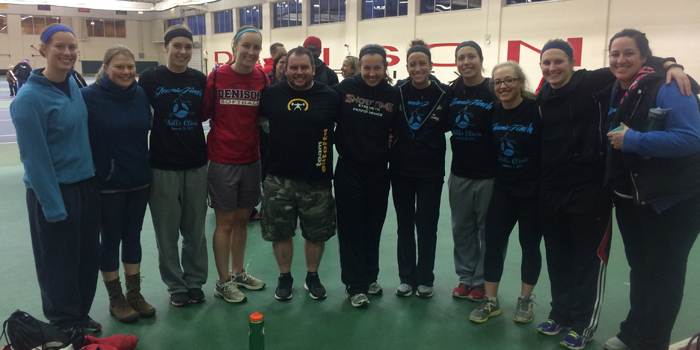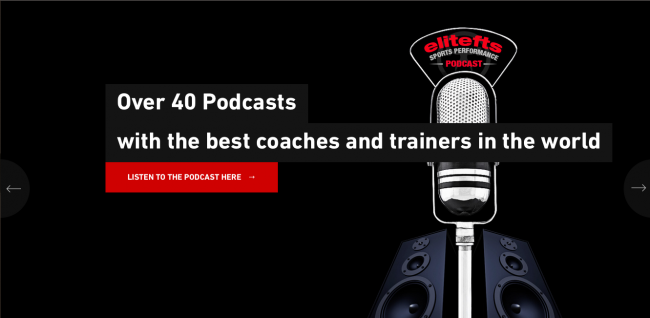
In my experience in the athletic, higher-ed, military, and now business setting; there are two major factors that can be causing your team (or staff) from succeeding at the highest level. Hopefully these will relate to your situation and provide some insight.
Lack of Trust
This one is totally obvious, but coaches miss this more often than not. It's not that coaches don't agree with how importation trust is. They sometimes are not experienced enough to know how to develop trust amongst the team. Lencioni goes one step further with the trust components. It is the base of his 5 dysfunctions of a team pyramid. He expands further to say that trust must be based on Vulnerability.
Vulnerability Based Trust
People can't trust someone they don't know. In order for someone to get to know you as a coach, you must allow people to get to know you as a person. That doesn't mean they need to know all your drama, just a little of what makes you tick. If they like you, they will work hard for you. If you are unable to let your assistants and athletes really get to know who you are as a person and not just your coaching philosophy; they won't be able to trust you.
Problem with building trust -
This is another reason why social media has hurt athletics (and our society). People start to interact with others as if their whole lives consist of tweets and Facebook statuses. People get tidbits of each other's character based on how witty they can be on the internet. A lot of people now-a-days have the most outgoing personalities online and have trouble making eye contact or forming a complete sentence when they are talking to someone in person.
Life-skill Assignment #1: Look up from your phone and practice saying hello to people.
Not being Trusted -
The most frustrating aspect of coaching for me was anytime I knew an athlete or another coach didn't trust me. This would drive me nuts. I didn't have an issue with trusting athletes or interns. As the head coach, you can manipulate the situation where they would not continue with the program or at least couldn't negatively effect their teammates' behavior. I didn't worry about an athlete if I didn't trust them because of these basic factors:
- As a Strength Coach: Everything was kept as objective as possible and I was lucky enough to have a core group that would hold teammates accountable.
- As a Football Coach: If the coaching staff didn't trust a player, they didn't play and the trust thing is now contained in the locker room (which is the components you have least control over anyway) and not the field.
Not trusting the head coach or AD -
The question for assistants to head coaches and head coaches to AD is this:
Does my boss have my best interest in mind?
Priorities for any head coach have to be:
- The program
- The team (there is a difference between 1 &2)
- The staff
- The player (the well-being (mental health) of the player is considered with #2, the individual needs is #4)
As a strength and conditioning coach, the order is revered somewhat:
- The athlete
- The staff
- The team
- The program
So beyond the good of the program and the team, the assistant needs to be able to trust the head coach. There were times that I felt like I SHOULD have been fired (giving up a fake punt for a TD, several ACL injuries on the same team) due to being my worst critic, but I never feared getting fired. I knew that the head coach trusted I had the best interest of the program and the team ahead of my own. I trusted the head guy that we would be able to communicate differences without me having to worry about who is paying the mortgage. That trust happened because of the close relationships we forged.
If you have a job where you are worried about getting fired, then quit. You already have lost. You are hurting the team and yourself. You can't coach while afraid. The worst coach in the world is the one scared to lose his/ her job.
Worrying about what people outside the team or organization think
In athletics, there are always going to be people who don't like your team and subsequently your players, and you. For no other reason but you are associated with another university. That is not as much of an issue to me. When there are fans heckling in person or from the parking lot, I am good with that. When a writer for the school paper questions your calls, I'll live with it. It's the anonymous internet posters that are.... well, just sad. Unfortunately, they define our society. When no one knows who you are, it is so easy to criticize coaches and athletes who are actually out there competing.
Most people do not have their job evaluations posted on the internet like coaches do
Imagine if everyone had every mistake they've made at their place of employment listed on their website. Every sale lost, misdiagnosis, every case lost. People may not be so critical to coaches and athletes.
The fitness industry has the largest collectioin of individual with huge egos and low self-esteem I have ever seen. This is an article in itself. As much as ego is important for coaching, controlling that ego and directing it is as important. High self-esteem. Low ego of self. High ego of team.
The Ego of us vs the Ego of you
There are two types of egos. The goal of the self, which is unacceptable and will lead basically to nowhere, and the ego of the product or the organization. When Dennis Lehane was a screenwriter for the series The Wire, he explained how heated and personal their meeting would get within their team. Individuals with Egos would be verbally abused for the simple fact it was unproductive if nothing else. But, the ego of the show was, and should be, a inflated as anything on TV. That is essential for survival.
Another example would be somewhere like Westside barbell where the gym itself has an unbelievable ego. But, the lifters at WSBB cannot have an ego, or it doesn't work. Individual egos erode the armor of a place built on its reputation. You will never see an all-conference guard with a higher ego than the offensive line. He won't last long. The #1 defense in a certain conference is that way because of and produces, a very large ego. The Legion of Boom will always carry more weight and worry more offensive coordinators and wide-outs than Richard Sherman by himself.
As coaches, we must produce ego within the weight room, amongst a team, and at our university. Individual egos, even masked as confidence, can interrupt the long journey of gaining championship caliber performance.
Life-Skill Assignment #2: Promote your team, staff, or athletes without promoting yourself.
Brian Cain has summed up the 10 most dangerous words for coaches. Here is a quote from Brian:
"What Will Other People Say? What Will Other People Think?
There are ten deadly words that if you say them or believe them you will crush your performance before you even start. If you’re trying to pursue excellence, if you’re trying to get to the top of your field, if you listen to these ten deadly words, you are going to sabotage your career. Those ten deadly words are, “What will other people say? What will other people think?” It doesn’t matter what other people say. It doesn’t matter what other people think. In your pursuit of excellence, people are going to try and pull you down and talk trash about you because you are more successful then they are. It is lonely at the top, but high expectations beat low reality any day. When people stab you in the back or say things about you behind your back it is because you are in front of them. Be more concerned with your character, what you know is true than what other people say or think about you."
To sum it up
- Take time to get to know (really know) your assistants, interns, and athletes.
- People cannot trust you until they know you. Let your guard down.
- Concern yourself more with what your coaches and athletes think about you, the program and themselves. Not what people outside the organization think.
- Remember, everyone has a different side of them when they have an audience and especially if they are anonymous. The more direct, face to face interaction, the more truth you will hear.
- High Ego for team. High self-esteem. Low ego for self.
TRAINING
Repetition Week
Double Kettlebell Squat
supersetted with....
Kettlebell Swing
53s for 20, 15, 10









